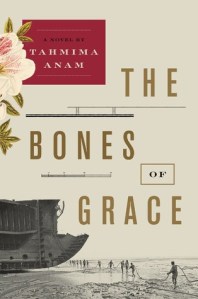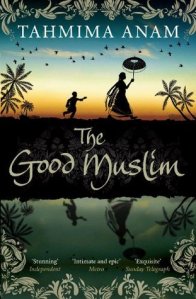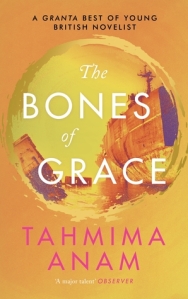Tahmima Anam’s The Bones of Grace can easily be read as a standalone novel, however its central character Zubaida Haque, is the third generation of the family we met in her earlier novels.
A Golden Age was set mostly in 1971 during the Bangladesh War of Independence when the territory split from West Pakistan and was seen from the perspective of Rehana, widow and mother of Maya and Sohail, actively involved in the events that transpired during that time.
The Good Muslim was set in the years directly after independence and the impact on the family, seen mostly from Maya’s perspective.
In the Bones of Grace, life is lived far from the effects of war, by a generation looking for meaning in less noble and more personal pursuits. Zubaida is educated abroad and more interested in the fossils of the Ambulocetus ‘walking whale’ and the implications on evolutionary belief than the politics of her own country. She is unsure – but follows it anyway – of the path leading her towards marrying her long-term boyfriend, whom her family approve of, after a brief encounter with Elijah, a man she met at a classical concert in Cambridge.
 The novel is predominantly a second person narrative addressed to Elijah, long after she has lost him, narrating the events of their meeting, her pursuit of the dinosaur fossils straight after meeting him, her return to Dhaka and then her escape from her family to Chittagong, to work alongside a female film-maker interviewing workers on the ship graveyards, beaches where enormous liners are dismantled and parts recycled.
The novel is predominantly a second person narrative addressed to Elijah, long after she has lost him, narrating the events of their meeting, her pursuit of the dinosaur fossils straight after meeting him, her return to Dhaka and then her escape from her family to Chittagong, to work alongside a female film-maker interviewing workers on the ship graveyards, beaches where enormous liners are dismantled and parts recycled.
The narrative also gives voice to Anwar, a man she meets in Chittagong who in narrating to the two women the events of his life that brought him there, reveals a connection to Zubaida’s past, a history that haunts her and perhaps goes someway towards explaining her confused behaviour.
It is a novel of profound and often neurotic reflections, as we only ever hear Zubaida’s version of events, in a lament to her lost lover, whom we don’t spend enough time with to sympathise or consider what his perspective might have been, her address to him might well be actually to herself, for its purposes appears more to be an attempt to find and understand herself, requiring her to be far from everyone to do so.
It’s a worthy follow-up to the first two novels, written in quite a different style, which demonstrates the growth and confidence of the writer. I read the three books back to back and enjoyed them all, though I would say that the first novel was the more powerful, perhaps not surprising as it was inspired in part by many of the events lived through by Anam’s grandmother.
I reviewed this book for BookBrowse, if you click on the link you can read their latest reviews.






 Dear Husband,
Dear Husband,
